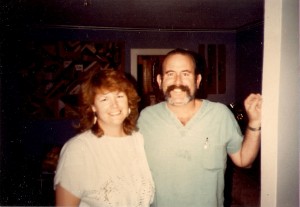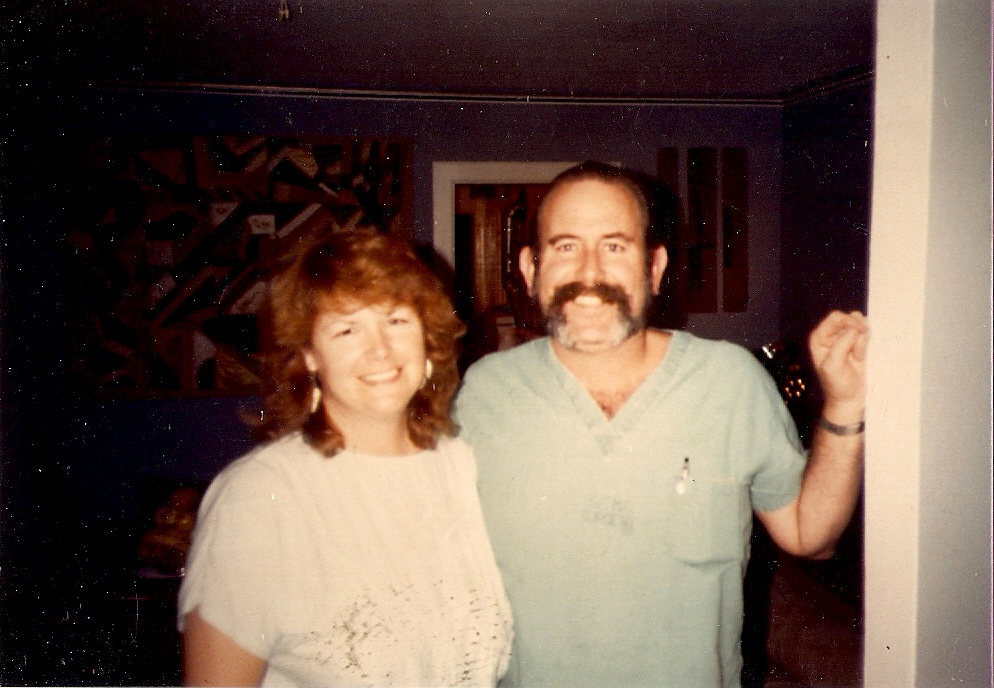
Today is World AIDS Day, commemorating the 34 million living people with AIDS, and the nearly 30 million who have died. The numbers are so big they’re hard to take in. But for me, as for so very many others all over the world, AIDS is a personal story.
One of those 30 million was my cousin, James Cameron Lambert. Jim and I were born the same year, and I guess in my mind, I always took for granted that we’d die at the same time. Things didn’t work out that way, however.
Jimmie and I spent summers together. He was my best friend. As the eldest children, we teamed up to torment our younger siblings. When we played house, we were the parents, and we made them be the babies, and bossed them around. We often sat up with a flashlight under the sheets, talking late into the night. When I got my first bra, Jimmie was the person I rushed home to tell.
It took a while for Jimmie to figure out his life and his sexuality. He liked women, and at one point was engaged. As part of his journey of self-exploration, he made it out to San Francisco, and he ended up living in Oakland.
Jimmie was smart, funny, and passionate. Like most of the men in our family, he was a big, handsome guy, with a lot of personal charisma. He worked in Berkeley in a psychiatric hospital, on a locked adolescent ward. I loved visiting him there and watching him work with the kids. He cared for his patients like a mother, but he could calm them and set limits for them with just a few words in his deep voice.
Jimmie introduced me to sushi, and green tea ice cream. To celebrate the Harmonic Convergence, we got up in the middle of the night, wrapped my toddler in a blanket, and drove up near the top of Mt.Tamalpais. With our backs to the Pacific, we watched the sun break through the clouds below us. It was magical.
Jim and his partner, K.C., built an aviary in their hilly back yard, and raised parrots. From him, I learned that parrots have the emotional life and intellect of 3-year-old children. He explained to me the importance of placing the birds he sold with a permanent family, so they would not face the trauma of separation and displacement.
When men in their community began succumbing to AIDS, Jimmie and K.C. lost many friends. By the early 1990s, an estimated eighty percent of gay men in the Bay Area were HIV positive. When medical researchers asked for subjects for a study, Jimmie and K.C. volunteered. They learned they were both infected with the virus.
A few months later, Jimmie came to Austin. He took me to lunch in a crowded restaurant. He said he had something to tell me, and I was absolutely not to fall apart when he did. He had enough to deal with without having to take care of my feelings. And I was not to tell anyone else. His mother had plenty of grief ahead of her, and he didn’t want her spending months or years anticipating what was to come. He was gentle with me, but firm, in much the same way I’d seen him with his young patients.
In less than a year, Jimmie’s condition had deteriorated into full-blown AIDS. He died a short time before his 45th birthday, held in the arms of his lover and his dad, my uncle. It was just three years before the widespread implementation of the retroviral drugs that have since saved so many lives, an irony over which I shed many tears.
K.C. lived a couple more years. Jimmie had always been the extrovert, the one who organized their social life and activities. They had always been devoted to each other, and when I went back to stay with K.C. I found him very lonely. Finally, his mom came and took him home, tenderly caring for him until the end.
That’s my family’s AIDS story.
My friend, Sister Mary Beth Lloyd, works with other families, children whose parents have died of AIDS, taking care of each other. She’s written a book called AIDS Orphans Rising. You might expect it to be depressing, but it’s an amazing story of hope and inspiration. If you’d like to learn more about these kids, and how you can help, please visit her website:
http://www.aidsorphansrising.org/wordpress/

Thanks for sharing your story. The sadness for me today is the number of people who are still dying because they can’t afford the medicine or live in an area where they have no access to any available treatment. It pains me to know drugs are available but not accessible to all that need them.
I agree, Martha. That’s the saddest thing. And, as Sr. Mary Beth’s book shows, it’s tearing apart the lives of so many families, and changing whole cultures.
I’m sorry about your loss Jillian. What a great friendship you had. Early in the days of the AIDS epidemic my stepmom had a friend Matt who learned he had AIDS and he passed about a year later. It was a sad time and he was depressed. I remember really feeling for him and not knowing what to say.